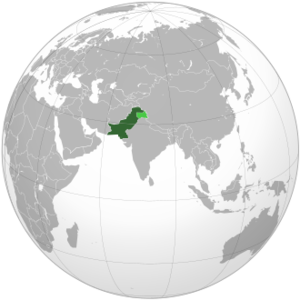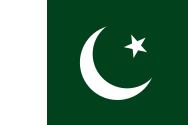Pakistan
| Pakistan |
|
|
Source information is available at [ Sources ] |
Pakistan, officially the Islamic Republic of Pakistan, is a country in South Asia. It is the world's fifth-most populous country, with a population of almost 227 million, and has the world's second-largest Muslim population. Pakistan is the 33rd-largest country by area, spanning 881,913 square kilometers (340,509 square miles). It has a 1,046-kilometer (650-mile) coastline along the Arabian Sea and the Gulf of Oman in the south and is bordered by India to the east, Afghanistan to the west, Iran to the southwest, and China to the northeast. It is separated narrowly from Tajikistan by Afghanistan's Wakhan Corridor in the north and also shares a maritime border with Oman.
History
Pakistan is the site of several ancient cultures, including the 8,500-year-old Neolithic site of Mehrgarh in Balochistan and the Indus Valley Civilisation of the Bronze Age, the most extensive of the civilizations of the Old World. The region that comprises the modern state of Pakistan was the realm of multiple empires and dynasties, including the Achaemenid, briefly, that of Alexander the Great; the Seleucid, the Maurya, the Kushan, the Gupta; the Umayyad Caliphate in its southern regions, the Hindu Shahi, the Ghaznavids, the Delhi Sultanate, the Mughals, the Durranis, the Sikh Empire, British East India Company rule, and most recently, the British Indian Empire from 1858 to 1947.
Spurred by the Pakistan Movement, which sought a homeland for the Muslims of British India, and election victories in 1946 by the All-India Muslim League, Pakistan gained independence in 1947 after the Partition of the British Indian Empire, which awarded separate statehood to its Muslim-majority regions and was accompanied by unparalleled mass migration and loss of life. Initially a Dominion of the British Commonwealth, Pakistan officially drafted its constitution in 1956 and emerged as a declared Islamic republic. In 1971, the exclave of East Pakistan seceded as the new country of Bangladesh after a nine-month-long civil war. In the following four decades, Pakistan has been ruled by governments whose descriptions, although complex, commonly alternated between civilian and military, democratic and authoritarian, relatively secular and Islamist. Pakistan elected a civilian government in 2008 and 2010, and adopted a parliamentary system with periodic elections.
Pakistan is a middle power and has the world's sixth-largest standing armed forces. It is a declared nuclear-weapons state and is ranked amongst the emerging and growth-leading economies, with a large and rapidly growing middle class. Pakistan's political history since independence has been characterized by periods of significant economic and military growth and political and economic instability. It is an ethnically and linguistically diverse country with similarly diverse geography and wildlife. However, the country faces challenges, including poverty, illiteracy, corruption, and terrorism. Pakistan is a member of the United Nations, the Shanghai Cooperation Organisation, the Organisation of Islamic Cooperation, the Commonwealth of Nations, the South Asian Association for Regional Cooperation, the Islamic Military Counter-Terrorism Coalition, and is designated as a major non-NATO ally by the United States.
Pakistan is a country in South Asia with a population of about 169 million. Its official languages are Urdu and English. The capital is Islamabad, and the largest city is Karachi.
Pakistan was formerly a part of India and became independent in 1947. Islam is the state religion.
Early and medieval age
Some of the earliest ancient human civilizations in South Asia originated from areas encompassing present-day Pakistan. The earliest known inhabitants in the region were Soanian during the Lower Paleolithic, of whom stone tools have been found in the Soan Valley of Punjab. The Indus region, which covers most of present-day Pakistan, was the site of several successive ancient cultures, including the Neolithic Mehrgarh and the Bronze Age Indus Valley Civilisation (2,800–1,800 BCE) at Harappa and Mohenjo-Daro.
The Vedic period (1500–500 BCE) was characterized by an Indo-Aryan culture; during this period, the Vedas, the oldest scriptures associated with Hinduism, were composed, and this culture later became well-established in the region. Multan was an important Hindu pilgrimage center. The Vedic civilization flourished in the ancient Gandhāran city of Takṣaśilā, now Taxila in Punjab, which was founded around 1000 BCE. Successive ancient empires and kingdoms ruled the region: the Persian Achaemenid Empire (around 519 BCE), Alexander the Great's empire in 326 BCE, and the Maurya Empire founded by Chandragupta Maurya and extended by Ashoka the Great, until 185 BCE. The Indo-Greek Kingdom founded by Demetrius of Bactria (180–165 BCE) included Gandhara and Punjab and reached its greatest extent under Menander (165–150 BCE), prospering the Greco-Buddhist culture in the region. Taxila was one of the earliest universities and centers of higher education in the world, established during the late Vedic period in the 6th century BCE. The school consisted of several monasteries without large dormitories or lecture halls where religious instruction was provided individually. The ancient university was documented by the invading forces of Alexander the Great and recorded by Chinese pilgrims in the 4th or 5th century CE.
At its zenith, Sindh's Rai Dynasty (489–632 CE) ruled this region and the surrounding territories. The Pala Dynasty was the last Buddhist empire, which, under Dharmapala and Devapala, stretched across South Asia from what is now Bangladesh through Northern India to Pakistan.
Spanking in Pakistan
In the 20th century, school corporal punishment fell out of fashion and was gradually banned in many countries, a trend that continues until the present day.
As of May 2008, Pakistan permits corporal punishment in schools.
According to a report by Amnesty International in the 1990s, Pakistan is one of about 20 countries that still use judicial corporal punishment.
In homes and schools in Pakistan, there is corporal punishment and also other forms of punishment such as murgha.
Swat Valley
Swat Valley is a valley and an administrative district in Pakistan. In 2009, a teenage girl was spanked with a belt by a Taliban officer in Swat Valley (the apt name is a coincidence). The event was recorded and posted to the Internet, sparking some outrage.
- http://www.timesonline.co.uk/tol/news/world/asia/article6030741.ece
- http://www.organizedrage.com/2009/04/talaban-beating-young-woman-in-swat.html
- http://seattletimes.nwsource.com/html/nationworld/2008983335_paktape04.html
Spanking and Spanking Art in Pakistan
( We have no further information from SAOTK as of April, 2022 )
( We have no further information from Corpun.com as of Sept, 2024 )
See also
- More information is available at [ Wikipedia:Pakistan ]
Chat rooms • What links here • Copyright info • Contact information • Category:Root

